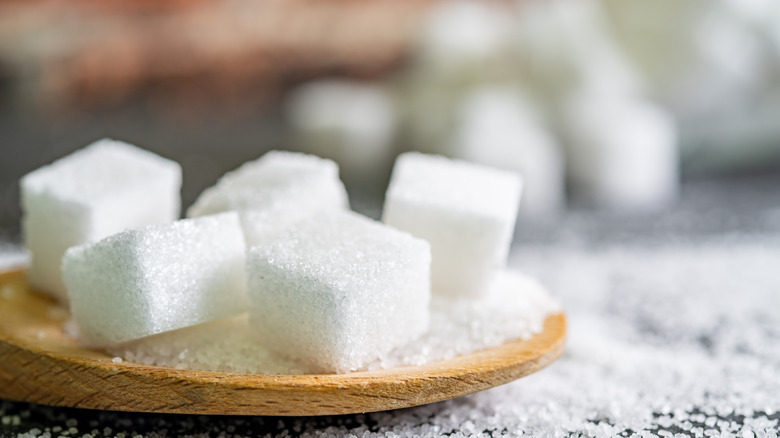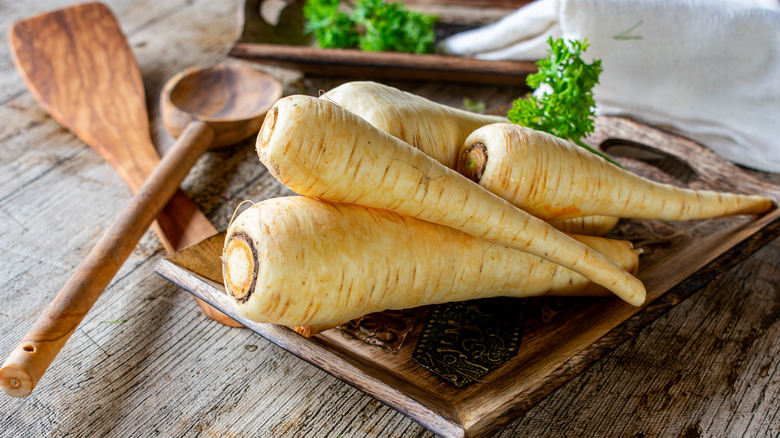The Reason Sugar Cravings Are More Common During The Winter
As the weather cools, many of us put our grills away and begin to sink into comfort foods: stews, casseroles, rich sauces, Holiday centerpieces, warming drinks. It's thought that there is a biological predisposition for this. In the warmer months, we eat lighter, while heavier foods is much more in vogue during the winter months. Beyond just enjoying heavier, richer foods, how does sugar intake factor into this diet? If you were to think about your usual consumption over the winter and the holidays, there are clearly a ton of opportunities for sugary treats — far much more than you may normally consume in the summertime (ice cream, notwithstanding).
Of course, there are geographical differences at play with winter diets, but the general observation certainly has merit. So, what causes this? Are we merely repeating our ancestors' seasonally-specific dietary needs with shifting weather? Is there more of a cultural or societal aspect at play? You may be surprised to learn how the season plays a role.
What is SAD?
PCC Markets attributes this phenomena to the notion of SAD, or Seasonal Affective Disorder. For some, this may affect your dietary habits, resulting in your craving of sugary foods in order to combat any negative feelings during the winter. The piece extrapolates on this, noting that people who suffer from SAD consume more sugar to ultimately increase serotonin. When carbohydrate-heavy foods are consumed, insulin levels rise. "When this happens, the amino acid tryptophan travels up to our brains, where it is converted to serotonin — a hormone that makes us feel happy," writes PCC Educator Nick Rose.
Conversely, though, many are aware of sugar rushes, in which the crash is 10 times worse than the high. It's also known that excessive sugar consumption can adversely impact your weight and health at large. PCC Markets notes that alternative sugar — such as coconut sugar, which is a low-glycaemic index (GI) sweetener derived from coconut – are preferable to standard white, granulated sugar.
Ways to combat SAD
Peddler's Sons concurs, noting that SAD can affect energy, weight, and melatonin levels. The piece also notes that certain vegetables, primarily root vegetables, also tend to taste sweeter during these winter months. This is supported by the fact that vegetables grown in colder weather can transform starches to sugar, in a process called chill-sweetening (per Hello Homestead). So all those mashed potatoes, sweet potato casseroles, and pumpkin pies actually include brighter, more robust-tasting vegetables. Peddler's Sons suggests reaching for natural sugars found in many fruits and vegetables as opposed to eating your body weight in candy, cake, or cookies.
Vibrant Health notes that if you do find it challenging to combat SAD, it can be helpful to minimize caffeine intake (which has a hand in how sweetness is perceived), consume more water than usual, avoid artificial sweeteners, get adequate amounts of sleep and exercise, and stick to fiber-rich, naturally-sweet produce.
What to remember about sugar during winter
A study conducted at The University of Kansas (KU) and reported by Health Shots in 2019 noted that sunlight also plays a role. "For many people, reduced sunlight exposure during the winter will throw off circadian rhythms, disrupting health sleep and pushing 5% to 10% of the population into a full-blown episode of clinical depression," according to Stephen Illardi, an associate professor at KU. Illardi also notes that, "added sugars have a pro-inflammatory affect on the body and brain." So those of us reaching for sugary foods and drinks to combat SAD may actually be worsening the issue.
Cooking Light states that upping your Vitamin D and omega-3 intake can also help fend off Seasonal Affective Disorder, and offer a more sustainable (and healthy) long-term defense than merely munching on super-sweet snacks.
Maintaining a healthy diet and following these simple expert tips can be a surefire way to combat SAD and enjoy a safe, warm winter this year.



